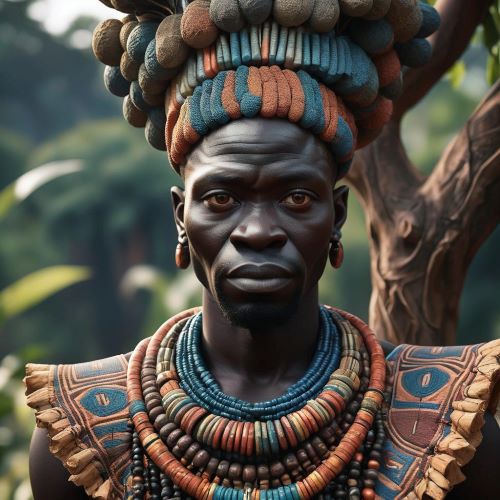Songye Gods
The Songye Gods form a vital part of the traditional belief system of the Songye people, who inhabit the southeastern regions of the Democratic Republic of Congo. Deeply spiritual, the Songye people honor a complex world of deities, spirits, and ancestral forces that guide the natural and human worlds. The Songye Gods are believed to govern essential aspects of life such as health, fertility, protection, and justice. Central to this spiritual framework is the strong emphasis on community, harmony with nature, and respect for the unseen forces that influence daily life.
Among the Songye, the most powerful gods are often linked to the forces of creation and destruction, embodying the balance between opposing elements like life and death, good fortune and misfortune. These divine beings work alongside spirits known as “bikudi,” and are often approached through sacred rituals, divination, and the crafting of ritual objects. Many of the Songye’s religious practices involve the use of powerful artifacts like the famous nkisi figures, which are believed to house spirits or channel the power of the Songye Gods for healing, protection, or justice. Every act of worship reflects a desire to maintain equilibrium between the physical and spiritual realms.
The myths and traditions surrounding the Songye Gods reveal a deep respect for the mysteries of nature and the ancestral world. Songye mythology often speaks of gods who bestowed knowledge of medicine, farming, and social laws, ensuring the survival and prosperity of the community. Some deities are said to take the form of animals, embodying traits such as strength, wisdom, and vigilance. Through oral storytelling, music, and dance, the legends of the Songye Gods have been passed down through generations, ensuring that their influence endures in both ritual and daily life.
Despite the pressures of modernization and the spread of new religions, the legacy of the Songye Gods continues to shape cultural practices among the Songye people. Traditional healers, spiritual leaders, and blacksmiths still draw upon the knowledge believed to have been gifted by these divine beings. Ceremonial masks and sculptures, often used in initiations and community rites, remain potent symbols of the connection between the human and divine worlds. The reverence for the Songye Gods serves as a bridge between past and present, helping maintain a strong cultural identity rooted in ancient wisdom.
Today, the Songye Gods are increasingly recognized by scholars, collectors, and admirers of African art and spirituality. The striking masks and sculptures associated with their worship have captured global attention, but beyond the visual appeal lies a profound spiritual tradition that speaks to the universal human need for connection, guidance, and protection. As interest in indigenous African mythologies grows, they stand as powerful reminders of a worldview that honors the sacredness of life, the power of nature, and the enduring wisdom of ancestral knowledge.
The Songye Gods form a vital part of the traditional belief system of the Songye people, who inhabit the southeastern regions of the Democratic Republic of Congo. Deeply spiritual, the Songye people honor a complex world of deities, spirits, and ancestral forces that guide the natural and human worlds. The Songye Gods are believed to govern essential aspects of life such as health, fertility, protection, and justice. Central to this spiritual framework is the strong emphasis on community, harmony with nature, and respect for the unseen forces that influence daily life.
Among the Songye, the most powerful gods are often linked to the forces of creation and destruction, embodying the balance between opposing elements like life and death, good fortune and misfortune. These divine beings work alongside spirits known as “bikudi,” and are often approached through sacred rituals, divination, and the crafting of ritual objects. Many of the Songye’s religious practices involve the use of powerful artifacts like the famous nkisi figures, which are believed to house spirits or channel the power of the Songye Gods for healing, protection, or justice. Every act of worship reflects a desire to maintain equilibrium between the physical and spiritual realms.
The myths and traditions surrounding the Songye Gods reveal a deep respect for the mysteries of nature and the ancestral world. Songye mythology often speaks of gods who bestowed knowledge of medicine, farming, and social laws, ensuring the survival and prosperity of the community. Some deities are said to take the form of animals, embodying traits such as strength, wisdom, and vigilance. Through oral storytelling, music, and dance, the legends of the Songye Gods have been passed down through generations, ensuring that their influence endures in both ritual and daily life.
Despite the pressures of modernization and the spread of new religions, the legacy of the Songye Gods continues to shape cultural practices among the Songye people. Traditional healers, spiritual leaders, and blacksmiths still draw upon the knowledge believed to have been gifted by these divine beings. Ceremonial masks and sculptures, often used in initiations and community rites, remain potent symbols of the connection between the human and divine worlds. The reverence for the Songye Gods serves as a bridge between past and present, helping maintain a strong cultural identity rooted in ancient wisdom.
Today, the Songye Gods are increasingly recognized by scholars, collectors, and admirers of African art and spirituality. The striking masks and sculptures associated with their worship have captured global attention, but beyond the visual appeal lies a profound spiritual tradition that speaks to the universal human need for connection, guidance, and protection. As interest in indigenous African mythologies grows, they stand as powerful reminders of a worldview that honors the sacredness of life, the power of nature, and the enduring wisdom of ancestral knowledge.

